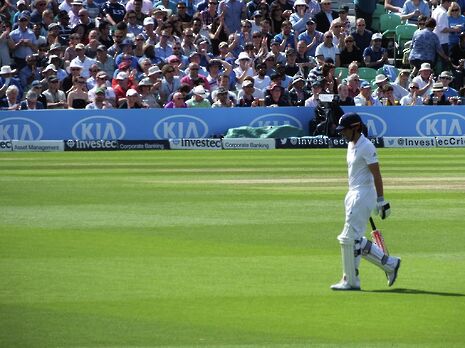Alastair Cook finally gets the axe
Rory Sale reflects on England’s decision to finally sack Alastair Cook as ODI Captain

When Alastair Cook was finally sacked on 19th December from the England One Day captaincy, there was relief amongst all of us wanting England to succeed at the World Cup. It had been a long time coming.
This does not stop it being something of a surprise. Ever since Kevin Pietersen’s sacking, The ECB made a decision to stand by Cook through thick and thin. He was the man to take England forward into a new era after the calamitous Ashes campaign. This persistence and consistency in selection eventually paid off in the summer with three back-to-back test victories to win the series against a disheartened India. In the one-day format however, England have been nothing short of stubborn.
It has long been clear that Cook, with an average of 27 at a strike rate of 71 in 2014, is not good enough to warrant a space in the one-day side. These numbers recall Mike Atherton’s description of him as a “donkey” and a “plodder”. Even more frustrating for England fans was the fact that Alex Hales, recently ranked the best T20 batsman in the world, was being kept outside the team by the tedious Cook. It is not often that we produce a man who can smash it out the park with consummate ease, so when one comes along, get him in and quick. Pietersen, a man with less tact than Nigel Farage, is very often mistaken; however in tweeting “Dear Alastair, if you care about England’s chances this winter, please resign,” he had a point.
So why have England taken such a long time to accept their mistake, cut their losses and drop Cook? It seems to be a product of the rational conservatism of English cricket developed during Andy Flower’s tenure. The steady selection policy did often work, with players picked for the long run and not simply on temporary form. However, if the man leading the side should not be in it, you have to be bold. This is especially true in the one-day format. Take David Warner. He had not played a single first class game before Australia got him in the T20 and one-day side. They saw his ability to dominate bowling attacks and made the bold decision to give him a go, now he is one of the world’s leading players in all three formats. England should have done the same with Hales.
However, now Morgan only has a few warmup games in which he can prepare for the World Cup. Expectations would be higher if he had had control of the team through the summer and the tour to Sri Lanka. It is not all doom and gloom though. If the selectors go with Hales and Ali at the top, this coupled with the hitting of Morgan and Butler has the makings of a decent batting line-up. The bowling still remains slightly suspect, but if those batsmen fire, they can certainly win us games, especially if the dangerous Morgan can find a much-needed return to form.
Finally, it must be said that despite all my criticisms of Cook as a one-day player, he remains entirely the right man for the Test job. His dismissal from the white ball set up should not in any way endanger this. One only has to look at his record to see that he is about to stroll past Graeme Gooch as England’s highest ever test run-scorer, and already has the most test hundreds (25) of any English player. In fact, relieving him of the one-day duties might be exactly what he needs to return to his run-accumulating best. The World Cup offers him a timely break after what can only have been an extremely testing year in which he has handled himself with immense dignity. Come the Ashes this summer, he might well be glad that he got sacked.
 Interviews / ‘People just walk away’: the sense of exclusion felt by foundation year students19 April 2024
Interviews / ‘People just walk away’: the sense of exclusion felt by foundation year students19 April 2024 News / Copycat don caught again19 April 2024
News / Copycat don caught again19 April 2024 News / John’s spent over 17 times more on chapel choir than axed St John’s Voices22 April 2024
News / John’s spent over 17 times more on chapel choir than axed St John’s Voices22 April 2024 News / Climate activists smash windows of Cambridge Energy Institute22 April 2024
News / Climate activists smash windows of Cambridge Energy Institute22 April 2024 Theatre / The closest Cambridge comes to a Drama degree 19 April 2024
Theatre / The closest Cambridge comes to a Drama degree 19 April 2024





